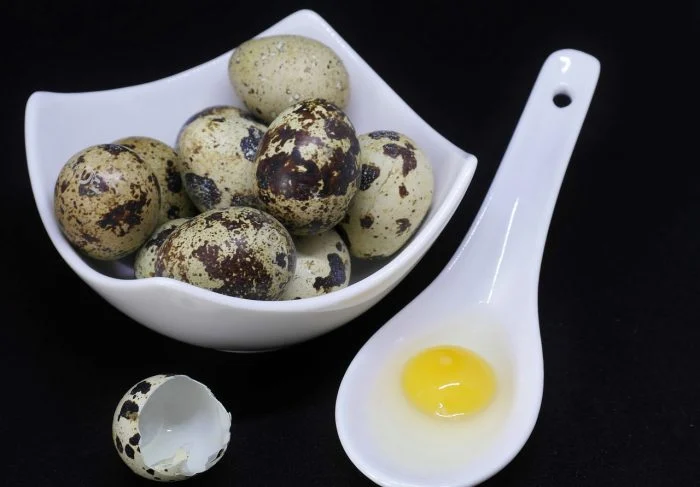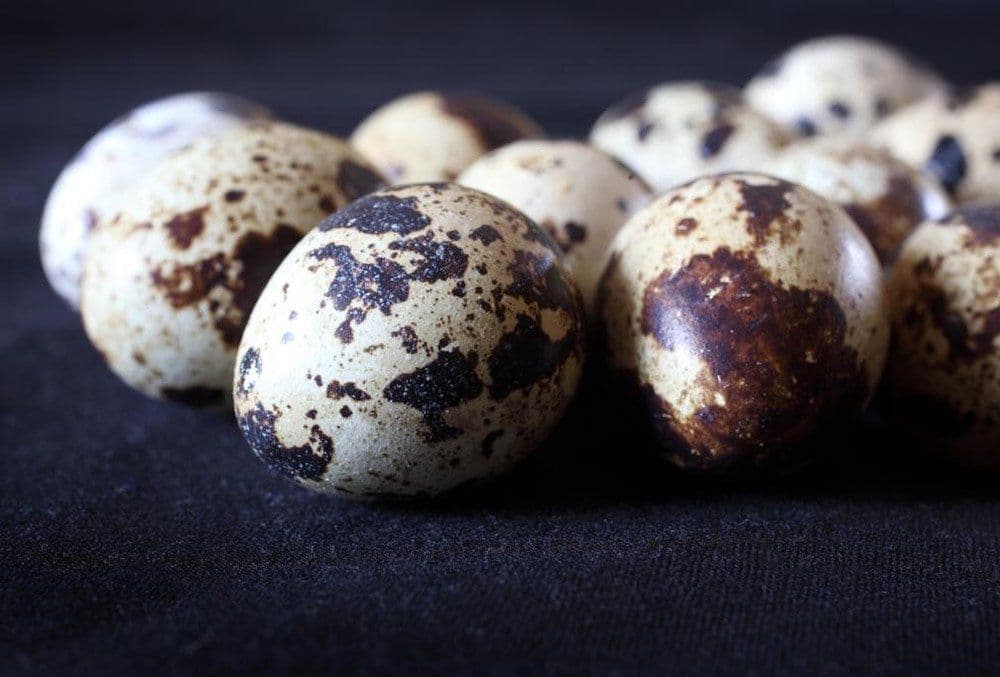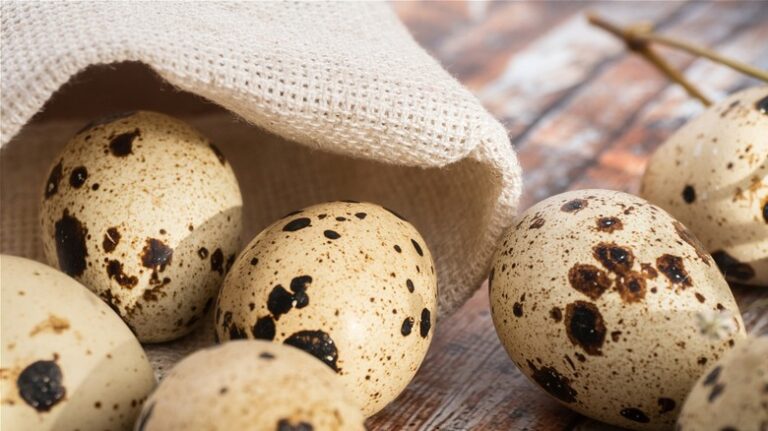Quail eggs taste like chicken eggs, just smaller. Raw ones are bland and dense, while soft-boiled ones are rich and creamy. Hard-boiled quail eggs are firm and a bit rubbery. They’re similar to chicken eggs but creamier due to a larger yolk-to-white ratio.
Moreover, they are nutritious, with protein, fats, and vitamins. They’re a tasty alternative to chicken eggs, but rare and pricey. Besides being delicious, quail eggs offer health benefits like boosting immunity and bone health. Remember, they spoil quickly, so it’s best to eat them within a few days.
Here, you will learn more about quail eggs details. Keep Reading!
Nutrition Value

| Nutrient | Amount per Quail Egg |
| Calories | 14 |
| Protein | 1 gram |
| Fat | 1 gram |
| Carbs | 0 grams |
| Choline | 4% DV |
| Riboflavin | 6% DV |
| Folate | 2% DV |
| Pantothenic acid | 3% DV |
| Vitamin A | 2% DV |
| Vitamin B12 | 6% DV |
| Iron | 2% DV |
| Phosphorus | 2% DV |
| Selenium | 5% DV |
Even though they’re tiny, quail eggs offer a substantial amount of vitamin B12, selenium, riboflavin, and choline, along with some iron.Further, these nutrients play crucial roles in breaking down food for energy, supporting thyroid function, promoting a healthy nervous system, and aiding in red blood cell formation. All of this goodness comes in a low-calorie package, with just 14 calories per egg.
Health and Nutritional Advantages of Quail Eggs
Quail eggs stand out as a powerhouse of protein and essential vitamins. Packed with all nine amino acids, they boast a higher biological value compared to proteins in beef or soybeans. Notably, they surpass other egg types, including chicken, duck, turkey, or goose, in iron content per gram making them an excellent choice for those needing to boost iron levels, particularly pregnant women.
In addition to their rich nutrient profile, they are low in salt, making them suitable for individuals on sodium-restricted diets, such as those with congestive heart failure. Abundant in folate, a vital B vitamin, quail eggs contribute to preventing congenital disabilities and combating anemia. Moreover, the higher riboflavin content in quail eggs, compared to chicken eggs, makes them particularly beneficial for pregnant women.
Furthermore, these nutrient-packed eggs also serve as a quick and convenient snack, requiring less than 10 minutes to cook. They are recognized for their antioxidant properties, potentially aiding in reversing cellular damage and addressing allergy symptoms.
Quail eggs are loaded with good stuff for your health. They have antioxidants that might help fix cell damage and ease allergy symptoms, according to a reliable source.
In a 7-day study with 77 people who had allergy issues, symptoms like sneezing and a runny nose got better in just an hour after they took a quail egg antioxidant and zinc supplement. However, it’s not entirely clear if the benefits came only from the egg compounds.
Lastly, there’s also a study with mice that showed it yolk could help with a severe food allergy-related condition called eosinophilic esophagitis.
Downsides of Consuming Quail Eggs
While quail eggs offer numerous health benefits, there are some drawbacks to consider. The primary concern is the cost, with prices ranging from $5 to $12 per dozen, depending on freshness and source. Additionally, sourcing eggs from free-range or factory-farm birds can be challenging due to vague labeling standards, leaving consumers uncertain about the living conditions of the quails.
Cholesterol levels in them are higher than in chicken eggs, according to a study. This may be a consideration for individuals monitoring their cholesterol intake.
Moreover, those with egg allergies may find it challenging to consume quail eggs without medical supervision or prescription medication. Lastly, the distinctive ‘gamey’ taste of quail eggs may be an acquired preference for some individuals trying them for the first time.
It’s essential to weigh these factors against the nutritional benefits when deciding to incorporate quail eggs into your diet.
Precautions
Quail eggs are often not pasteurized, meaning they haven’t been heat-treated to kill any harmful bacteria on the shell. Due to this, it’s crucial for pregnant women and individuals with weakened immune systems to avoid raw or partially cooked quail eggs. Make sure they are fully cooked with no runny or gelatinous yolk before consumption.
Besides, if you have an allergy to chicken eggs, there’s a chance you might also be allergic to quail eggs. It’s important to be extremely careful and, if you want to test your tolerance for quail eggs, do so under the supervision of a medical professional.
Surprisingly, you can be allergic to them even if you’re not allergic to chicken eggs. If you have any worries or questions, it’s best to talk to your healthcare provider to get the right guidance.
Comparison with Chicken Eggs
Quail eggs are way smaller than chicken eggs, about one-third of their size. Despite their small size, quail eggs have big yolks. Some folks say that since many nutrients are in the yolk, they might be more packed with nutrients compared to chicken eggs when you consider the weight.
Let’s look at a comparison for every 3.5 ounces (100 grams) of quail and chicken eggs:
| Nutrient | Quail Eggs (about 10 eggs) | Chicken Eggs (about 2 large eggs) |
| Calories | 158 | 148 |
| Fat | 11 grams | 10 grams |
| Protein | 13 grams | 12 grams |
| Choline | 48% of the DV | 61% of the DV |
| Riboflavin | 61% of the DV | 32% of the DV |
| Vitamin B12 | 66% of the DV | 43% of the DV |
| Iron | 20% of the DV | 9% of the DV |
In a nutshell, quail eggs are healthy, but they’re not dramatically better than chicken eggs nutritionally. It’s your call if you want to include them in your diet.
Uses and Easy Preparation of Quail Eggs

Quail eggs can be cooked in similar ways to chicken eggs, but they take way less time due to their small size.
In Japan, they are a special treat and are often used, sometimes raw, in sushi. Other Asian countries like South Korea and Indonesia enjoy quail eggs as a quick snack or a side dish to other meals.
In South American countries, these eggs make a tasty topping for things like hot dogs and hamburgers.
A simple way to give quail eggs a try is by hard-boiling them. You can munch on them as a snack, toss them into salads, or chop them up for a unique egg salad.
Here’s what you need for hard-boiled quail eggs:
- 12 quail eggs
- Water
Here’s how to do it:
- Raise the water in a small pot to a roaring boil.
- Gently add the eggs to the pot.
- Lower the heat to a medium boil and cook for 3–4 minutes.
- To peel, crack the shell by rolling the egg lightly on a flat surface. Start peeling from the bottom, removing both the shell and inner membrane.
- You can store hard-boiled quail eggs in the fridge for 3–5 days
FAQ’s
Are Quail Eggs Better than Chicken?
No, While quail eggs are smaller, they have larger yolks, making them more nutritious by containing more protein, fat, double the iron and riboflavin, and about one-third more vitamin B12 than chicken eggs. However, they are not nutritionally superior, and the choice depends on preference.
How Many Quail Eggs per Day for Adults?
Adults can safely consume up to three whole quail eggs per day. Studies suggest that eating eggs is generally safe, and the American Heart Association recommends up to seven eggs per week for those who enjoy them.
Are Quail Eggs Expensive?
Yes,Quail eggs are moderately priced, often found in China markets or specialty gourmet stores. Prices vary, but they are generally higher than chicken eggs due to their smaller size.
How to Store Quail Eggs?
Store quail eggs in the refrigerator, away from heat sources like direct sunlight or open oven doors. Treat them like chicken eggs to maintain their freshness.
How Do Quail Eggs Taste Scrambled?
Scrambled quail eggs taste remarkably similar to chicken eggs, with a slightly creamier texture due to the higher yolk-to-white ratio. They are an excellent alternative for various culinary uses.
How Do Quail Eggs Taste Baked?
Quail eggs bake similarly to chicken eggs in most recipes, making them versatile for cooking and baking. They perform well in everyday recipes, although separating yolks from whites may be a bit challenging.
How Do Quail Eggs Hard Boil?
Quail eggs can be hard-boiled in 3-4 minutes, resulting in diminutive and charming hard-boiled eggs. Once cooled, they can be peeled and enjoyed like hard-boiled chicken eggs.
Should I Get Jumbo Quail?
Yes, Jumbo Coturnix quail are recommended for those seeking backyard quail for kitchen use. Jumbos are known for being the best layers, producing eggs ideal for cooking and baking.
How Do Quail Eggs Taste Compared to Chicken Eggs?
Quail eggs taste very similar to chicken eggs when scrambled, hard-boiled, or baked. The only noticeable difference may be the slightly creamier texture due to the higher yolk percentage.
Final Words
They share a remarkably similar taste to chicken eggs, with a slightly creamier texture due to their higher yolk percentage. Whether scrambled, hard-boiled, baked, or fried, the flavor profile remains familiar, making them a versatile substitute in various dishes.
Further, the small size of quail eggs makes them a delightful addition to salads, and pastas or simply enjoyed on their own. Their taste is a pleasant surprise, and if you’re curious, obtaining some quail eggs for a personal taste test can be a rewarding culinary experience.
Overall, they offer a unique and delicious alternative, enhancing the diversity of flavors in your culinary repertoire.

